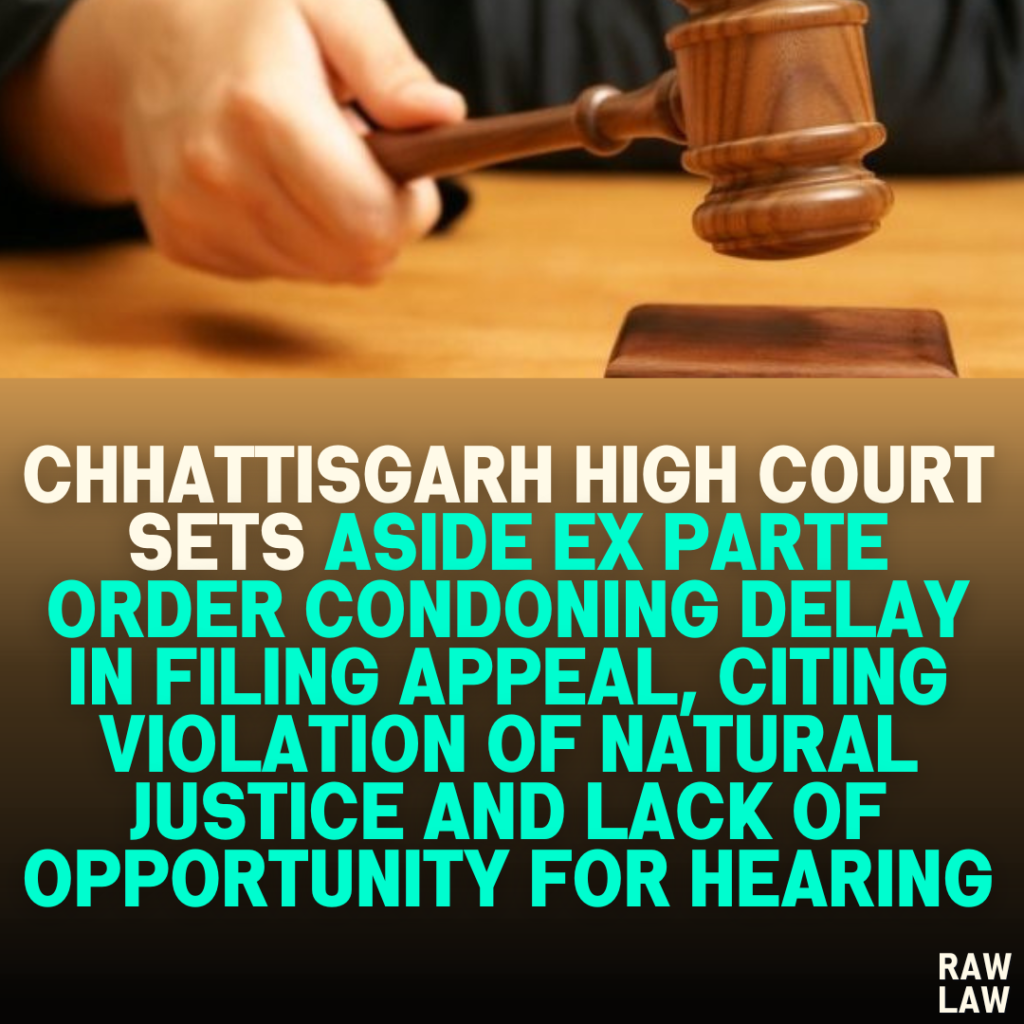Court’s Decision: The Chhattisgarh High Court set aside the impugned order dated 16.07.2024 passed by the First Appellate Court, which had condoned the delay in filing the appeal under Section 5 of the Limitation Act, 1963. The High Court held that the order was perverse and illegal because it was passed without giving the petitioner an opportunity of being heard. The case was remanded to the First Appellate Court with directions to decide the application for condonation of delay after providing a proper hearing to the petitioner.
Facts: The petitioner had initially filed a civil suit which was decreed in her favor by the trial court on 03.10.2023. The defendant, however, filed an appeal on 10.06.2024, after the limitation period had expired, along with an application for condonation of delay under Section 5 of the Limitation Act. Without issuing notice or affording the petitioner an opportunity to present her case, the First Appellate Court condoned the delay and allowed the appeal to proceed.
Issues: The primary issue was whether the First Appellate Court erred in condoning the delay in filing the appeal without providing the petitioner an opportunity to object, as required by law.
Petitioner’s Arguments: The petitioner argued that the First Appellate Court acted illegally by condoning the delay without issuing notice to her or giving her an opportunity to present her case. This, she claimed, violated her legal rights as she was not heard on the matter.
Respondent’s Arguments: The respondents had successfully filed for condonation of delay in the First Appellate Court but did not have an opportunity to argue before the High Court in this petition.
Analysis of the Law: Under Section 5 of the Limitation Act, the court may condone a delay in filing an appeal if sufficient cause is shown. However, when such an application is filed, the opposite party has a right to contest it. The principles of natural justice require that notice be given to the opposing party and an opportunity to present their objections must be provided.
Precedent Analysis: The court referred to well-established principles that delay should not be condoned without providing a hearing to the affected party, especially when such delay creates a legal right for the opposite party to contest.
Court’s Reasoning: The High Court observed that when an appeal is filed beyond the limitation period, it is mandatory to provide the opposite party an opportunity to object to the condonation of delay. The failure to do so violates principles of natural justice. The court found that the First Appellate Court’s order condoning the delay was passed ex parte, which was a significant procedural flaw. The impugned order was set aside on the ground that the petitioner had been deprived of her right to be heard.
Conclusion: The High Court allowed the petition, set aside the order of the First Appellate Court, and remanded the matter back with instructions to hear both parties before deciding on the application for condonation of delay.
Implications: This judgment underscores the necessity of adhering to procedural fairness and ensuring that all parties are given an opportunity to be heard before a court passes orders that affect their legal rights. It also reinforces the principle that courts must strictly comply with the provisions of the Limitation Act, especially when it comes to condoning delays.




Pingback: Bombay High Court Quashes Revenue's Order; Directs Refund of Rebate Claims, Rejecting Retention of Duty on Exported Goods Without Legal Basis - Raw Law
Pingback: Supreme Court Clarifies Scope of "Workman" Under Industrial Disputes Act, Upholds Termination of Assistant Engineer Without Reinstatement or Compensation - Raw Law